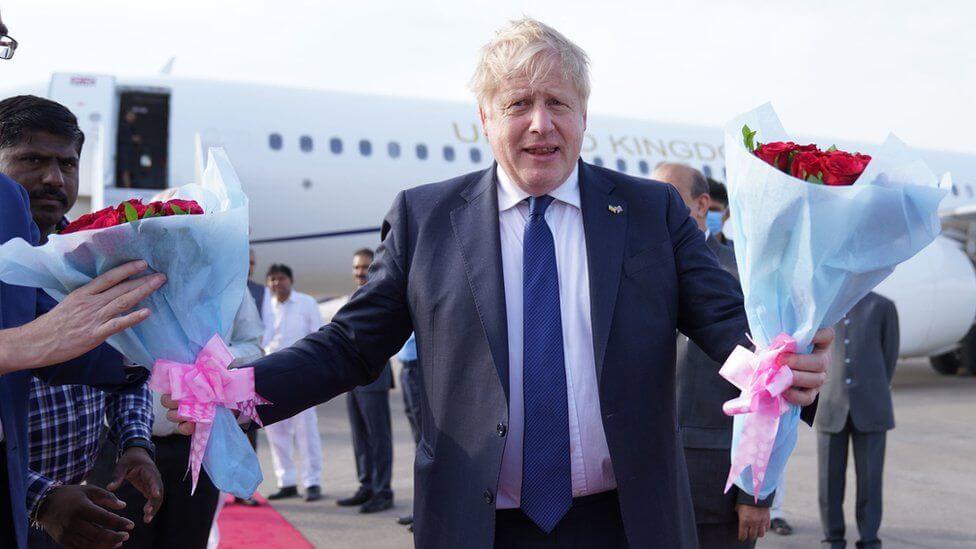British Prime Minister (PM) Boris Johnson visited India on Thursday for a two-day tour from April 21-22. Johnson spent his first day in Ahmedabad and then travelled to New Delhi to meet with his Indian counterpart, Narendra Modi.
After arriving in Ahmedabad, Johnson tweeted that it is “fantastic to be in India, the world’s largest democracy” and said that there are “vast possibilities for what our great nations can achieve together.”
As India celebrates its 75th year of independence, I’m hugely optimistic about the depth of the friendship between our countries, and the security and prosperity it can deliver for our peoples for generations to come.
— Boris Johnson (@BorisJohnson) April 22, 2022
🇬🇧🇮🇳 pic.twitter.com/4MP62aAHiW
“Our powerhouse partnership is delivering jobs, growth and opportunity. I look forward to strengthening this partnership in the coming days,” he added.
While in Ahmedabad, Johnson announced several trade agreements. “The PM will use his visit to India to boost our collaboration with one of the world’s fastest growing economies, slashing trade barriers for UK businesses and driving jobs and growth at home,” an official press release said.
It’s been a real pleasure to be in Gujarat today to see the fruits of the incredible partnership between the UK and our friends in India.
— Boris Johnson (@BorisJohnson) April 21, 2022
Today we have confirmed more than £1 billion in new investments between our two great countries, creating almost 11,000 new jobs in the UK. pic.twitter.com/dvR0OG775n
The release said that “UK and Indian businesses will confirm more than £1 billion in new investments and export deals today in areas from software engineering to health, creating almost 11,000 jobs across the UK.”
These investments include thousands of new jobs in the electric car manufacturing, software, and renewable energy sectors in the UK and India.
“The Prime Minister will also welcome OneWeb signing a historic contract for satellite launches with New Space India Limited, the commercial arm of the Indian Space Research Organisation,” the release added. OneWeb is a UK-based satellite communications company.
During a joint press conference with PM Modi in New Delhi on Thursday, Johnson said that the UK’s ties with India are one of the “defining friendships” of the 21st century. The British PM announced several initiatives, including a “new and expanded defence and security partnership” that will allow both countries to “forge tighter bonds.”
The new defence deal involves the creation of an India-specific ‘open general export licence,’ something that would “reduce bureaucracy and slash delivery times for defence procurements” from the UK to India. Johnson also announced that London and New Delhi will partner on manufacturing new fighter jet technology and cooperate in maritime security.
In this respect, Johnson insisted that India and the UK that the Indo-Pacific region is “open and free.”
He also praised India’s achievements in making coronavirus vaccines and said that he had taken the vaccine developed by the Serum Institute of India and AstraZeneca. “I have the Indian jab in my arm, and it did me good. Many thanks to India,” he said.
Furthermore, he added that India is the “pharmacy of the world” and announced joint partnerships between India’s National Health Authority (NHA) and the UK’s National Health Service (NHS) in the field of digital health. A statement by the UK government said that the digital partnership would include collaborations in the fields of deep learning and Artificial Intelligence.
PM Modi said this is a “landmark” visit by Johnson that elevates the India-UK partnership to a new level. He announced that the two countries will expand collaboration in the fields of defence, manufacturing, technology, and design.
Wonderful to see you, my friend PM @BorisJohnson in India on a long-awaited visit. Look forward to our discussions today. https://t.co/6gUxR1PwPH pic.twitter.com/z6Ufv8zgAb
— Narendra Modi (@narendramodi) April 22, 2022
Modi said that India and the UK will also explore avenues for cooperation in the climate and energy fields. To this end, he announced that the UK will participate in India’s National Hydrogen Mission. Modi also announced that New Delhi and London will promote the growth of startups and Micro, Small and Medium Enterprises (MSMEs) in India and said that they have set aside a fund of $100 million to finance this initiative.
The Indian leader then underscored that the UK-India partnership is crucial to maintain a “free, open, inclusive, and rules-based Indo-Pacific.” In this regard, Modi announced that the UK will be joining India’s Indo-Pacific Ocean Initiative, which aims to create a secure and stable Indo-Pacific.
Regarding Ukraine, Modi said that “dialogue and diplomacy” is the way forward, emphasising the importance of every country respecting the sovereignty of others. In keeping in line with India’s position throughout the conflict, he did not specifically mention Russia’s role in the conflict.
Moreover, Indian Foreign Secretary Harsh Vardhan Shringla told reporters that Johnson put no pressure on Modi regarding India’s stance on Russia’s invasion of Ukraine. “They did discuss the Ukraine issue but there was no pressure,” he said. India has not explicitly condemned Russia’s invasion of Ukraine, as Moscow is New Delhi’s biggest supplier of weapons. It has also increased its import of heavily discounted Russian oil.
Finally, the PM called for a “peaceful, stable, and secure” Afghanistan and urged the Taliban to form an “inclusive and representative government. He added that the territory of Afghanistan must not be used for terrorist activities.
Delighted to call on UK PM @BorisJohnson during his India visit.
— Dr. S. Jaishankar (@DrSJaishankar) April 22, 2022
Discussed our expanding partnership and implementing the #IndiaUK Roadmap 2030. pic.twitter.com/T4RgznvJFE
Johnson also held separate discussions with Indian External Affairs Minister Subrahmanyam Jaishankar, wherein the pair discussed their shared vision on the future of bilateral ties.

